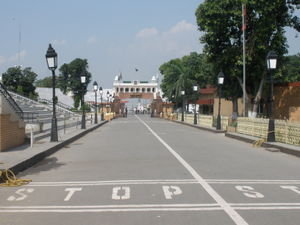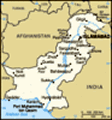Advertisement
Published: August 18th 2008

 At Attari and Wagah
At Attari and Wagah
It's an easy crsooing in the afternoon, but a rowdy show in the evening...The halfway point of my time on the Subcontinent is the first reminder of my journey’s mortality. No longer is it acceptable to extend stays a night or two in a given village or hill town without earnestly pondering how my limited remaining time will be spent. The days now dwindle downward to a finishing point. As I sit on the apex of my travels, I am at once rejuvenated under the realization that time is not limitless and that there is much left to do and to accomplish. From this day forward when each day passes, I will look back and think that my arrival in Delhi and first nights in rough and rowdy Karol Bagh were such a long time ago. Only weeks have passed. Given what I have collected in my mind about the riddle that is India, it seems like it has been years.
The ride to the border at Attari is an unchanged moving postcard of pastoral Punjab infused by the realities of geopolitics. Water buffalo tow a bullock cart of mangoes roadside past an entrance to officers’ barracks. Farmers harvest rice in fields directly behind warehouses fenced off with barbed wire. For several kilometers, barbed

 From When I Have Come
From When I Have Come
What awaits me down the road?wire runs parallel with the road until it is interrupted by a military base, which is easily identifiable because of the gargantuan tank parked out in front.
From everything I had been told, I expected some tension at the border, a little drama, some commotion. What I got upon crawling out of the rickshaw was café sharks dragging me to their tarped palaces for a Pepsi and a chance to sell me pirated VCD’s of the daily ceremony that shuts the border off until the next morning. About six or seven dogs lay motionless at the foot of the red and white barred gate. A bus pulls up and deposits a full load of Indian Punjabis who all race to the locked gate and peer as far to the west as they can. I peered down at one of the seller’s watches: nine o’clock. And I ask him as we both study the newly arrived tourist’s behavior. “They are here for the ceremony?”
“Yes, many come here to see the border guards dance and perform.”
“But the border isn’t even open, and does not close until-”
“Four o’clock, sir.”
“They’ll be here all day?”
“Yes” he answered without any emotion. The temperature even by mid-morning was well into the nineties.
“And do what?”
“Wait.”
This is as close as they’ll ever come to reaching the other side where Punjab continues towards the Indus Valley. Unlike me, the average Indian cannot continue; he is turned back due to the consequences of politics and history.
The border does not open yet another hour. A Sikh money changer separated me from my Indian currency and replaced it with the new type of Rupee emblazoned with Jinnah’s face instead of Gandhi’s. I put the one hundred Rupee notes of each nation in front of me and stared at each face and asked them silently if they’d be happy with what they created. Was it worth the bloody massacres and the greatest forced migration of humans in the history of the planet? Would each care to know now that much of their respective legacy is synonymous with the face on the currency of two separate nations? For Jinnah, I think he would have found it to be the right move. But for Gandhi? Would his torment be unbearable?
Ten o’clock. I pay for my breakfast of drink and biscuits, bid farewell to the café owner, money changer, and the flies of Attari. I hesitate as I turn into the border area between the two nations, expecting to be stopped, questioned, interrogated or told that there were hoops for me to jump through first. Instead a border guard points me to an office where I go through departure proceedings. One of the advantages of making this border crossing at this period of time is that I am the only traveler in the Indian customs office. I fill out two forms, get one stamped, proceed through more needless formalities and piles of paperwork, and finally arrive at the customs check out. I am told to wait for five minutes. I see no reason why. The hall is empty but for me. Custodial staff point floor fans in my direction to cool off my wet shirt. I wait. And wait. A final inspection of paperwork and I am OK to go, but not before I am firmly requested to make some kind remarks in the visitor’s logbook. I write what they want to read. They are polite (true) and professional (also true). I skipped any mention of efficiency: It took nearly an hour to leave India.
Every twenty yards or so past the grandstands, ceremonial gates, and black barren flagpoles, a guard stops me to check my passport. After the third, I step over a thick white line in the asphalt and see that his name tag is not longer in Devanagari script, rather Arabic. All are polite and deliver me a glowing smile. At the far side of the crossing, under an archway, I register my arrival in front of a national television crew. I do not ask what the occasion is, but do appreciate all the handshakes and overbearing welcomes, especially as one guard pulls up a seat for me to sit down in front of the camera. I register my name in an antiquated logbook, like that on the side whence I have just come. There are more handshakes, including ones from the television crew.
The Customs and Immigration Office sparkles more intensely than a new Nordic airport. Fahed greets me, the only commuter in the hall with a double handshake. “Come with me, sir! Welcome to my country!” Someone has given these folks marching order to make us feel welcome, I think. And it works. “You must sit down with me and we will talk for about twenty minutes.”
Though confused, I comply. Why? Then I look up at the dormant ceiling fans and extinguished fluorescent ballasts. “Power cut?”
“Ah, yes. We wait. No problem.”
And that’s precisely what we do. Fahed makes small talk and insists I’ll enjoy it here. I believe him. A bus arrives from Delhi of returning passengers. They wait behind me after the electricity is restored. The officer punches my name through the computer, now rebooted.
“To Lahore?” I asked. “Bus?”
He pointed to a depot by some drink stands. “You wait for number four. No problem.” Thanking him, I walk out the Green Channel not realizing no one on either side has inspected my belongings. I enter the burning early afternoon sunshine. At a small mosque an imam begins the third call to prayer and the wails shoot out from two minarets. I find some shade and buy three Pepsis; the two others are for the local police officers keeping me company in the shade. I figure it to be a good idea to make nice until the bus arrives. One asks, “You like it here?”
I had legally been in the country for about eight minutes. “Yes.”
“First time here?”
“Yes!” I answer with gusto.
“From what country?” the second one peppers me.
I do not hesitate. I have no reason to. “U.S.A.”
They chatter with each other in Urdu. “You will like it here.” Bus four swerved around the cul-de-sac. The two officers carry my pack over and secure it to a seat, not their job, and shake my hand rigorously. They wave goodbye as the bus pulled away simultaneously calling aloud: “Welcome to Pakistan!”
Advertisement
Tot: 0.127s; Tpl: 0.012s; cc: 8; qc: 32; dbt: 0.0867s; 1; m:domysql w:travelblog (10.17.0.13); sld: 1;
; mem: 1.1mb







